
10 Books on Disability Justice
In progressive circles, disabled folks are all too often left out of conversations around inclusion and intersectionality. But you can’t achieve comprehensive social justice without disability justice.
As noted by Sins Invalid founder Patty Berne in “Skin, Tooth, and Bone — The Basis of Our Movement Is People: A Disability Justice Primer,” we must remember that “a disability justice framework understands that all bodies are unique and essential, that all bodies have strengths and needs that must be met.”
In our pursuit of disability rights, we should never narrow our focus on disabled people with the most privilege. Fundamentally, disability justice is intersectional, looking not just at ability but also race, socioeconomic status, sexuality, gender, religion, and more. It’s incredibly important to center the lives of those who sit at multiple intersections of identity. This key principle is why queer femmes of color have most often been at the forefront of disability rights advocacy.
This list is in no way comprehensive, but instead acts as a starting place to introduce people to disability justice and its many facets. I hope it provides encouragement — to both disabled and non-disabled readers — to explore more work by these incredible authors.
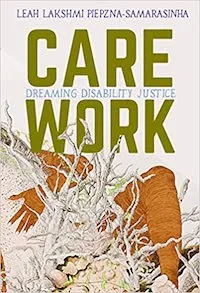
Care Work: Dreaming Disability Justice by Leah Lakshmi Piepzna-Samarasinha
Whenever people ask me about where to start learning more about disability justice, I recommend Care Work by Leah Lakshmi Piepzna-Samarasinha. The author does a great job of introducing readers to the topic as well as sharing other writers for additional reading. Each essay introduces new ideas around disability, building on the concepts from chapter to chapter.
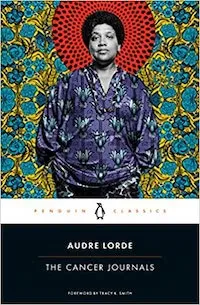
The Cancer Journals by Audre Lorde
Of course, The Cancer Journals is a must-read for anyone researching disability justice. In these essays, Audre Lorde recounts her own experience with cancer and society’s lack of acknowledgement of women’s pain. The ideas presented in the text aren’t just for those with cancer; these concepts can be applied to society’s view of illness and disability as well.
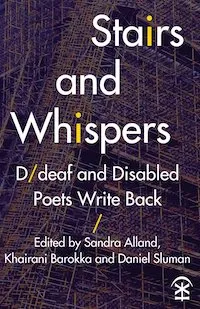
Stairs and Whispers: D/deaf and Disabled Poets Write Back Edited by Sarah Alland, Khairani Barokka, and Daniel Sluman
I love anthologies because they provide me with an opportunity to read a wide range of perspectives and introduce me to new writers and thinkers. Stairs and Whispers is a great example of an anthology that uses a wide range of media, including links to videos online, to communicate the lived experiences of disabled and D/deaf folks and their perspective on what disability justice means to them.

The Pedagogy of Pathologization: Dis/abled Girls of Color in the School-Prison Nexus by Subini Ancy Annamma
Subini Ancy Annamma uses a framework formed by critical race theory, disability studies, women and girls’ studies and more to discuss how society creates criminal identities for girls of color, particularly in school. With intersectionality at its core, The Pedagogy of Pathologization illustrates how girls of color are more likely to be described using language that implies deviance or disability.
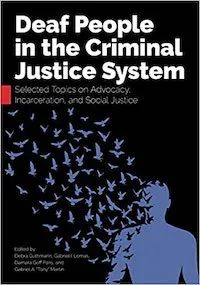
Deaf People in the Criminal Justice System: Selected Topics on Advocacy, Incarceration, and Social Justice by Debra Guthmann, Gabriel I. Lomas, Damara Goff Paris, and Gabriel A. “Tony” Martin
This book looks at how D/deaf and hard of hearing folks experience the criminal justice system. The various contributors discuss issues like the denial of providing sign language interpreters, lack of training for court and prison staff, the need for better advocacy for D/deaf folks, and so much more.
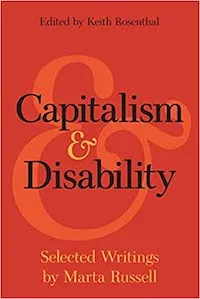
Capitalism and Disability: Selected Writings by Marta Russell
This series of essays by the late Marta Russell connects the ideas of how capitalism creates an environment where productivity is prized. In this dysfunctional value system, society considers disabled people as “less valuable” because we are viewed as less productive. This assumption harms disabled people in a wide range of ways, which Russell details throughout the book.
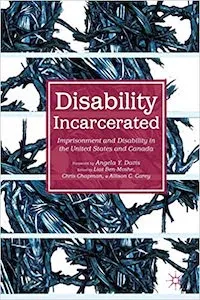
Disability Incarcerated: Imprisonment and Disability in the United States and Canada Edited by L. Ben-Moshe, C. Chapman, and A. Carey
An understanding of disability is vital to a comprehensive perspective on the U.S. and Canadian systems of incarceration. These 13 contributors approach the topic from a wide range of perspectives, giving a well-rounded view on the topic.
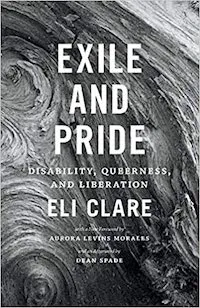
Exile and Pride: Disability, Queerness, and Liberation by Eli Claire
In this disability justice classic, which was first published in 1999, Eli Claire shares his experience as a genderqueer disabled person, discussing the intersection of queerness and disability. At the time of its publication, Exile and Pride was considered a groundbreaking text that called for a more accessible and inclusive social justice movement.
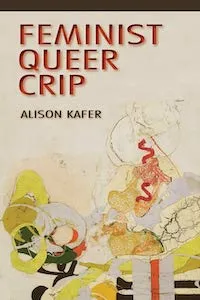
Feminist, Queer, Crip by Allison Kafer
In Feminist, Queer, Crip, Allison Kafer examines the concept of compulsory heterosexuality and compulsory able-bodiedness and compulsory able-mindedness. Society’s fundamental assumptions that everyone is straight or able-bodied until proven otherwise doubly harms disabled queer folks who sit at the intersections of those identities.
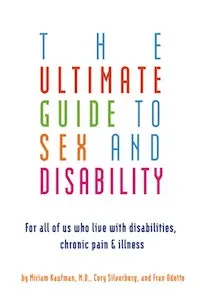
The Ultimate Guide to Sex and Disability: For All of Us Who Live With Disabilities, Chronic Pain & Illness by Miriam Kaufman, Corey Silverberg, and Fran Odette
In a society that often infantilizes disabled people, most people don’t view disabled people as sexual beings. This book pushes back against that stereotype and expands on ideas around sexuality in the disability community.
For additional reading, try this introduction to disability history in the U.S., or brush up on the state of disability representation in children’s books.









